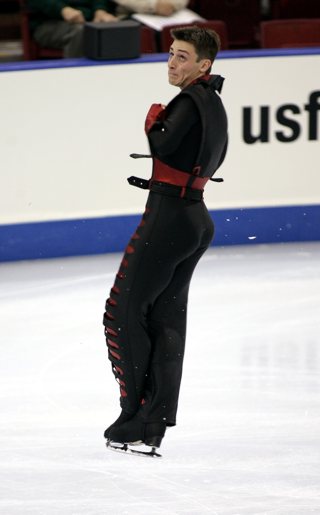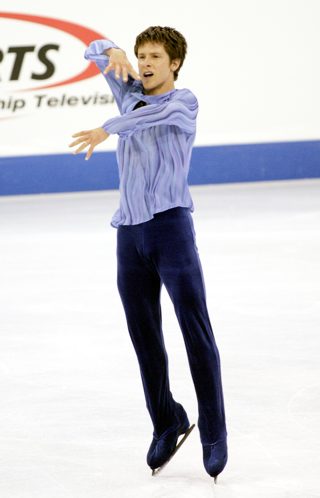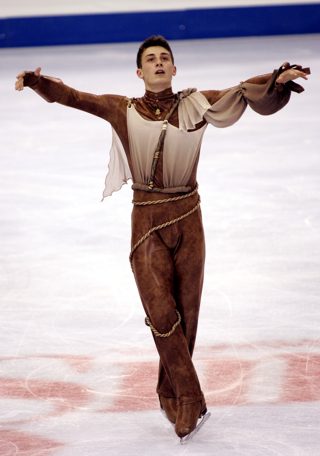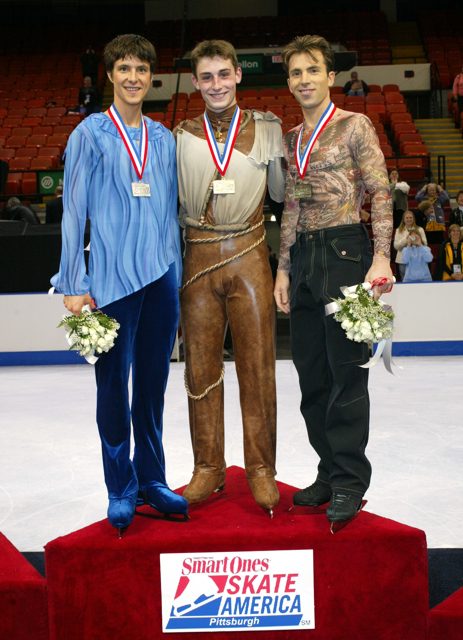Brian Joubert
|
His routine has a distinctly unfinished air. Wearing a strange black and red outfit with cutouts in the front and wide-rimmed gloves that looked as if they were borrowed from a Captain Marvel Outwits the Martians fifties serial movie, he soared through his quad toe to triple toe, landing the latter with his unique soft touchdown, and accomplished his triple Axel. But he received minus 2s (one judge even gave a minus 3) for flubbing his triple flip. And though both his circular and straight line footwork sequences received Level 2 status, the former had a strange stop three quarters the way through and the later seemed slow and lacking his normal energy level. "I was a little tired. (The mistake on the flip) was stupid. Itís the beginning of the season. Everything is new Ė new program Ė new judging system. It was difficult but I did my job. The beginning of the season with this program Ė it canít be perfect. But it will get better," Joubert declared. His score of 72.10 was announced as a personal record. That appeared odd but Joubert explained his main achievements have been in events under the old system. "In last seasonís Grand Prix events (where the new system was being used), I skated really bad short programs." It was in Spokane where Joubert won the 2002 Skate America with a great short program that Joubert met Olympic champion Alexei Yagudin who had to withdraw from this his last eligible contest. Yagudin, who has lived in the US since 1998, has vowed to help make Joubert his Olympic successor, a plan which has brought Yagudin much criticism in his home country of Russia. The current favorite for Olympic gold is Evgeny Plushenko, who is taught by Alexei Mishin, Yagudinís coach until after he won his first world title in 1998. Yagudin is helping Joubert in part by choreographing his routines. He is putting a lot of himself into the younger man and despite the presence of his regular coach, Laurent Depouilly, in Pittsburgh, the Frenchman is beginning to look too much like a Yagudin clone. Last yearís Skate America winner, Michael Weiss, skated immediately following Joubert and appeared extremely buff and sleek. His quad toe had enough rotation to be acknowledged as that jump, but he stepped out of the move and couldnít get up for the combination. All but one of the judges gave their lowest possible award, minus 3. (The other judge gave minus 2.) Weiss brought off the triple Axel although he had to struggle to control the landing, and a triple Lutz out of extremely interesting footwork. "Iíve been working with a spin specialist to add difficulty," Weiss said. "It is difficult to get a Level 3 spin but weíre adding difficulty with change of edges and change of feet. Anything that adds difficulty adds value to it in the new system." He was handicapped by a boot and blade problem. "I was planning to break in a new pair of boots and blades but not in competition. On Monday night my boots and blades just came apart so Iím skating on a new blade on the right foot thatís had just four sessions of practice and an old one on the left." The 28 year old former three time US champion, who is taught by Don Laws in Laurel, Maryland, skated to Henry V by Patrick Doyle played by the City of Prague Philharmonic Orchestra. His choreographer is his wife, Lisa Thornton-Weiss. The couple have two children, Annie-Mae, born September 1998, and Christopher Michael, born October 1999. Taking third place, much to his own amazement, is 27 year old Roman Serov from Moscow, who was fourth in the 2002 Russian championships. He now trains in Hackensack, New Jersey, with Craig Maurizi, and represents Israel. "I found out just last week, I was coming to Pittsburgh," explained Serov, who was a last minute replacement. He is married to Rachel Lior, who also skates for Israel. "I didnít try my quad. I just wanted to do my best program. It was good to skate clean after a two year break. In Russia there are a lot of skaters, so it was very difficult. I wanted to skate. I canít live without skating. But I had to sit out a season to change countries." Americans Ryan Jahnke and Evan Lysacek took fourth and fifth place in the field of eleven men from eight countries. Jahnke, who drew to skate third immediately prior to Joubert, performed to Bouree in E Minor by J.S. Bach arranged by Ian Anderson. It would have been a delightful showing had the married 26 year old not incurred a 1.0 deduction for splattering on his triple Axel. Jahnke, who was third in 2003 and fourth in the 2004 national championships, soared through an excellent "Boitano" hand-over-head triple Lutz earning a total of 60.83 points. Lysacek, skating last to the music Espana Cani, had minus 1s and minus 2s on his triple Axel; minus 1s on his triple Lutz to triple toe and fell on the triple flip. However, the 19 year old from Chicago, who was the 1999 US Novice and 2000 US Junior champion, is recovering from a hip stress fracture. The three time world junior silver medal winner is ranked fifth in the US at senior level. He now trains in California to train with Frank Carroll and Ken Congemi. I felt the most delightful showing of the event was the sixth placed Nicholas Youngís efforts to ĎSilent Movie Medleyí. The 22 year old, who was Canadaís junior champion in 2000, has been fifth at senior level for the past two years and won the very first competition to be skated under the new system. (2003 Nebelhorn Trophy in Oberstdorf, Germany.) Although he singled his triple Axel and doubled his triple flip after accomplishing a triple Lutz to triple toe, the routine was packed with interesting transitions and difficult footwork. The runner-up for the Canadian title, Ben Ferreira, gained seventh place. Eighth, skating to Take Five by Dave Brubeck, was the 25 year old many time Georgian champion, Vakhtang Murvanidze, who has left his hometown of Tbilisi to train with Alexander Zhulin in Montclair, NJ. The 23 year old Lun Song from Beijing gave an uninspired showing to Sarabande by Handel to place ninth. Alexander Shubin, the 2003 Junior world champion, is obviously still suffering from the aftermath of injuries which made him sit out last season. The Moscovite 23 year old took tenth place. Last March Stefan Lindemann became the first German man to medal in the (senior) world championship since Norbert Schramm took a silver in1983. That splendid form, however, was totally lacking in Pittsburgh, where the 24 year old fell twice incurring a deduction of 2.0 and made other errors to land firmly in last place. Despite his problems, however, his routine, to the soundtrack of Earnest by Charlie Mole, was pleasantly cheeky and suited his elfish style. It has potential. |
||||||||||||||||||||||||||||||||||||||||



